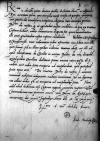Ex acerrima febre, quae nos plus mense torsit et prorsus excoxit, iam gratia Dei revalescere incipimus. Agimus vero immensas gratias Reverendissimae Dominationi Vestrae, quod et aegritudini nostrae condolere, et quae ex Johan Weze (*1490 – †1548), secretary to King Christian II of Denmark; in 1522 nominated Archbishop of Lund; in 1527 was banished from Denmark as Christian II's secretary, and joined the service of Emperor Charles V as his diplomat, 1537-1548 Bishop of Constance (WHALEY, p. 314)⌊oratore caesareoJohan Weze (*1490 – †1548), secretary to King Christian II of Denmark; in 1522 nominated Archbishop of Lund; in 1527 was banished from Denmark as Christian II's secretary, and joined the service of Emperor Charles V as his diplomat, 1537-1548 Bishop of Constance (WHALEY, p. 314)⌋ habuit, nobis communicare dignata sit. Quam benevolentiam illi omni gratitudine nostra referre curabimus.
Nobilem Krzysztof Osieczkowski in 1538 Kulm sword-bearer (Urzędnicy 5/2, p. 224; AT 18, p. 430-431)⌊Christophorum OssieczkowskiKrzysztof Osieczkowski in 1538 Kulm sword-bearer (Urzędnicy 5/2, p. 224; AT 18, p. 430-431)⌋, tunc vehementer febre aestuantes, non solum non allocuti sumus, sed ne illum quidem vidimus. Tantum abest, ut Krzysztof Osieczkowski in 1538 Kulm sword-bearer (Urzędnicy 5/2, p. 224; AT 18, p. 430-431)⌊illiKrzysztof Osieczkowski in 1538 Kulm sword-bearer (Urzędnicy 5/2, p. 224; AT 18, p. 430-431)⌋ aliquid commiserimus de Universal Council of Roman Catholic Church ⌊concilioUniversal Council of Roman Catholic Church ⌋ in aurem Reverendissimae Dominationis Vestrae dicendum. Quod quidem Universal Council of Roman Catholic Church ⌊conciliumUniversal Council of Roman Catholic Church ⌋ dubitant ferme omnes coire posse, et si coibit, erit nobis satis temporis ad consulendum, quid potissimum facto opus erit.
De viatico Reverendissimae
Do(minationis) or Do(minationi)⌈Do(minationis)Do(minationis) or Do(minationi)⌉
Vestrae, si animum veniendi nobiscum induxerit, modum inveniemus, sed, ut diximus, res adhuc dubia est, et temporis ad consulendum satis. Novi nihil aliud habemus, nisi Charles V of Habsburg (*1500 – †1558), ruler of the Burgundian territories (1506-1555), King of Spain as Charles I (1516-1556), King of Naples and Sicily, King of the Romans (1519-1530), Holy Roman Emperor of the German Nation (elected 1519, crowned 1530, abdicated 1556); son of Philip I the Handsome and Joanna the Mad of Castile⌊caesaremCharles V of Habsburg (*1500 – †1558), ruler of the Burgundian territories (1506-1555), King of Spain as Charles I (1516-1556), King of Naples and Sicily, King of the Romans (1519-1530), Holy Roman Emperor of the German Nation (elected 1519, crowned 1530, abdicated 1556); son of Philip I the Handsome and Joanna the Mad of Castile⌋ ingenti execritu vastare France (Gallia, Francia), the kingdom⌊GalliamFrance (Gallia, Francia), the kingdom⌋.
Commendamus nos fraterno amori Vestrae Reverendissimae Dominationis.


 BCz, 247, p. 274
BCz, 247, p. 274